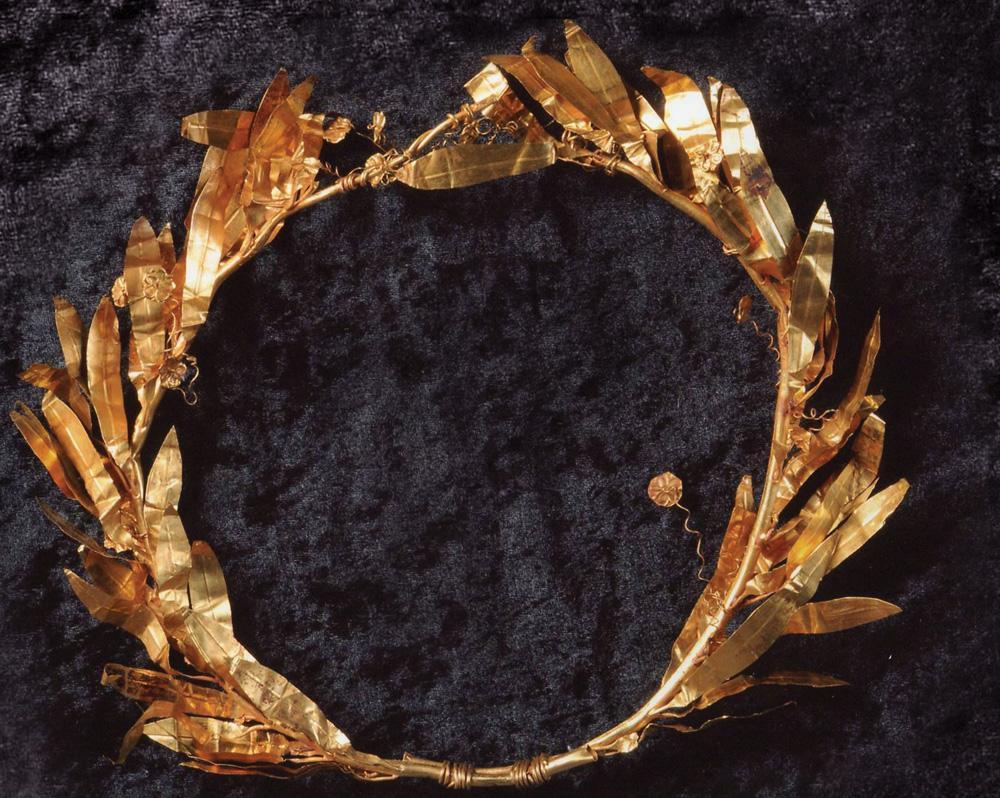
A golden crown stolen in 392 B.C. from the burial chamber of Hecatomnus in the Aegean town of Milas and later smuggled to Scotland is set to return to Turkey.
The tomb of Hecatomnus, the father of Mausolus, whose burial chamber (Mausoleum of Halicarnassus) in Bodrum is one of the Seven Wonders of the World, was robbed in 2008 and the stolen golden crown was found two years later in Scotland.
It was reported that Murat Aksakallı, 50, who manages a café in the Scottish capital Edinburgh, and his business partners Ali Sanal and Hakkı Özbey made talks with the officials of Sotheby’s and Bonhams auction houses in Edinburgh in order to find a buyer for the crown.
Scottish police got in touch with these three Turks in 2010, pretending to be a buyer, and seized the crown. When questioned, Aksakallı defended himself saying, “I inherited it from my grandfather Fazıl Aksakallı who died in Çemişgezek [district in eastern Tunceli province]. I had kept it for years and then forgot it. But I decided to sell it when my carrier companies got into financial trouble.” The case later went to court.
Judge Frank Mulholland did not file a criminal action against Aksakallı. Turkey, after learning about it from Interpol, became a party in the court. Scottish lawyers were hired. Creating an interesting legal example, they sent the golden crown to Ankara on condition that it will be returned.
The gold findings in the Hecatomnus mausoleum were examined and compared with the crown at the Turkish Atomic Energy Authority, which determined that it had being stolen from the tomb, and was later sent to Scotland.
The value of the crown is 250,000 British pounds in court records but Scottish experts said its real value is 1 million pounds.
On Dec. 2, the court ordered the return of the crown to Turkey. It is now set to be brought to Ankara in the coming days and then sent to the Milas Museum after being displayed there.
On Jan. 17, 2008, treasure hunters dug the bottom of a house in the Hisarbaşı neighborhood of Milas. Then they found the “tomb of the century” in Milas after the “treasury of the century,” Karun, and the “trove of the century,”Elmalı.
Refia Meraş was living with her husband Osman Diken in the house, which was built on a burial chamber, called Uzunyuva. Diken was aware of the treasure under the house. As treasure hunters attempted to dig the bottom of the house from time to time, Diken cemented the possible entrances of the burial chamber under the house.
Meraş’s relative, treasure hunter Yüksel Okur, was also one of those who attempted to dig the house. But Diken, who was taken to the Beçin district by Meraş’s brothers, was found dead there. The cause of his death is not known.
Meraş’s daughter Ayşen had the title of the house, inherited from Diken, and later on it was sold. Right after the sale, Deli Yüksel was found dead on July 21, 2008. The cause of his death is still not known.
Ayşen was married to Fuat Bilgin, who wanted to dig the house, but Meraş objected to him. Bilgin went against Meraş’s resistance by founding a natural gas company under the name of his brother Fatih Bilgin in Denizli on Sept. 1, 2006. He made Meraş one of the partners of the company, too.
When learning about these developments from an informant in October 2009, Milas Museum Director Erol Özen informed Milas Chief of Police Department Ömer Faruk Karataş and officer Savaş Günday.
For some reason, Karataş and Özen were appointed to different posts after seven to eight months.
In March and April 2010, the same informant reported that strange things were happening around the mausoleum as cars with foreign number plates were coming and going. He claimed that the real reason why the house was put up for sale for 1 million liras was to smuggle the burial chamber.
The Milas Museum Directorate learned that the house was sold to Mehmet Özeken and Doğan Acar and informed those who conducted the information.
The Cultural Heritage and Museums General Director at the time, Murat Süslü, who knows the area very well since he was the former provincial culture director, went to Milas for investigation.
Then Culture and Tourism Minister Ertuğrul Günay made examinations in the burial chamber and made an interesting statement. “It is better if the Interior Ministry inspectors get their hands on it,” he had said.
The Milas Public Prosecutor transferred the investigation to the gendarmerie forces after seeing that the police did nothing since Uzunyuva was robbed.
Meanwhile, a museum director was appointed to Ödemiş. “The director had worked in Milas for a long time. Let him work in another place,” said Milas district governor.
As far as I understand, the director was suspended from Milas upon his proposal.